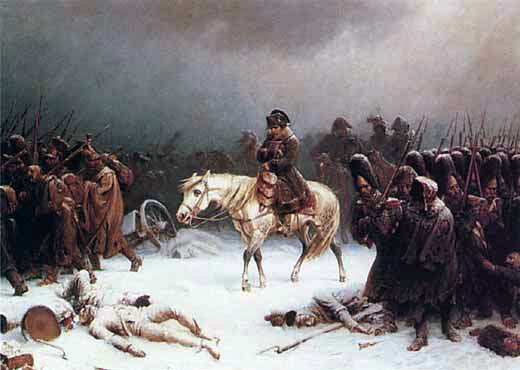Hola, Hive.
Peter Illich Thaikovsky es uno de los compositores rusos con más proyección en la historia de la música. Sus obras tienen una avasallante energía juvenil que contagia a quien la interpreta y quien la escucha.
En esta oportunidad les presento un fragmento de una de sus obras más famosas. Se trata de la Obertura 1812 que, en música nos describe los sucesos acaecidos en Rusia ese año durante el intento de invasión ejecutado por las tropas de Napoleón Bonaparte.
Rusia en aquella época era un país que sufría los embates de el régimen zarista, lo cual traía entre sus consecuencias marcadas diferencias de clases sociales. La aristocracia vivía en la opulencia y los excesos, mientras que el resto de la población vivía bajo una profunda pobreza.
El ejército de Napoleón Bonaparte, que esgrimía una bandera de supuesta igualdad, se aprovechó de esta situación para invadir el país centro europeo, cosa que en teoría resultaría muy fácil ya que el ejército ruso no era digno rival para las poderosas fuerzas francesas.
Peter Illich Thaikovsky is one of the most influential Russian composers in the history of music. His works have an overwhelming youthful energy that infects those who interpret and listen to them.
In this opportunity I present you a fragment of one of his most famous works. It is the Overture 1812 which, in music, describes the events that took place in Russia that year during the invasion attempt executed by the troops of Napoleon Bonaparte.
Russia at that time was a country that suffered the attacks of the czarist regime, which brought among its consequences marked differences in social classes. The aristocracy lived in opulence and excess, while the rest of the population lived in deep poverty.
Napoleon Bonaparte's army, waving a flag of supposed equality, took advantage of this situation to invade the central European country, which in theory would be very easy since the Russian army was not a worthy rival for the powerful French forces.

El ejército de francés se confió en su superioridad militar y fue directo a la batalla, la cual fue cruenta, fueron varios días de lucha. El punto es que las tropas napoleónicas no contaban con el detalle del frío y cruel clima ruso. Las fuerzas francesas no soportaron el voraz clima y sucumbieron ante las inferiores fuerzas rusas. Este fue uno de los más fuertes reveces sufridos por Napoleón Bonaparte.
La música escrita por Tchaikovsky narra en detalles toda esta historia, el sufrimiento de un pueblo empobrecido, el acecho de las tropas francesas con el sonido de La Marsellesa, himno nacional francés y la cruenta batalla. Luego se puede escuchar la nieve caer y la forma como el ejército de Napoleón termina por retirarse al no poder luchar en el inclemente clima.
Al final, se puede escuchar el himno de Rusia en medio de una marcha militar mientras suenan las campanas de la iglesia de San Petersburgo y los cañones que celebran la victoria del ejército ruso sobre las poderosas fuerzas francesas.
Esta interpretación la realizó la Orquesta Sinfónica Juvenil de Aragua en la sede central del Ministerio del Interior y Justicia de Venezuela en la Ciudad de Caracas. Espero lo disfruten.
The French army was confident in its military superiority and went straight into battle, which was bloody, it was several days of fighting. The point is that the Napoleonic troops did not count on the detail of the cold and cruel Russian weather. The French forces did not stand the voracious climate and succumbed to the inferior Russian forces. This was one of the strongest setbacks suffered by Napoleon Bonaparte.
The music written by Tchaikovsky tells in detail this whole story, the suffering of an impoverished people, the stalking of the French troops with the sound of the Marseillaise, the French national anthem and the bloody battle. Then you can hear the snow falling and the way the army of Napoleon ends up retreating because they cannot fight in the harsh climate.
At the end, the hymn of Russia can be heard in the middle of a military march as the church bells of St. Petersburg and the cannons that celebrate the victory of the Russian army over the powerful French forces ring out.
This interpretation was performed by the Aragua Youth Symphony Orchestra at the headquarters of the Ministry of the Interior and Justice of Venezuela in the city of Caracas. I hope you enjoy it.
Si quieres saber más de mi, puedes seguir mis publicaciones en Hive, Twitter o Instagram como @enyusael. También me puedes seguir en Youtube y Facebook.
If you want to know more about me, you can follow my publications in Hive, Twitter or Instagram as @enyusael. You can also follow me on Youtube and Facebook.
▶️ 3Speak

Nada más hermoso que la música clásica tocada por orquestas y más, cuando se trata de músicos de nuestro país. Gracias por compartir tu excelente trabajo, querido @enyusael. Te dejo mi apoyo por aqui y un abrazo. Lo estás haciendo muy bien!.
Que bello encontrar tu mensaje en este post mi querida @marybellrg. Siempre tus palabras me impulsan a seguir adelante con este trabajo que me llena tanto. Un fuerte abrazo querida amiga. Estuve un tiempo alejado, pero ya de vuelta sin desmayo
Demasiado buenos son tus contenidos amigo! @tipu curate
Upvoted 👌 (Mana: 9/16) Liquid rewards.
Congratulations @enyusael! You have completed the following achievement on the Hive blockchain and have been rewarded with new badge(s) :
<table><tr><td><img src="https://images.hive.blog/60x70/http://hivebuzz.me/@enyusael/comments.png?202011101950" /><td>You made more than 300 comments. Your next target is to reach 400 comments. <p dir="auto"><sub><em>You can view your badges on <a href="https://hivebuzz.me/@enyusael" target="_blank" rel="noreferrer noopener" title="This link will take you away from hive.blog" class="external_link">your board and compare yourself to others in the <a href="https://hivebuzz.me/ranking" target="_blank" rel="noreferrer noopener" title="This link will take you away from hive.blog" class="external_link">Ranking<br /> <sub><em>If you no longer want to receive notifications, reply to this comment with the word <code>STOP